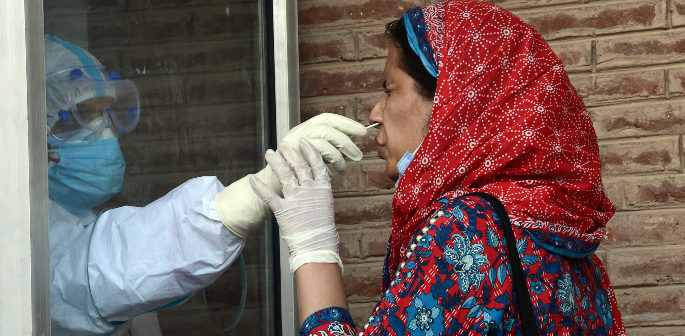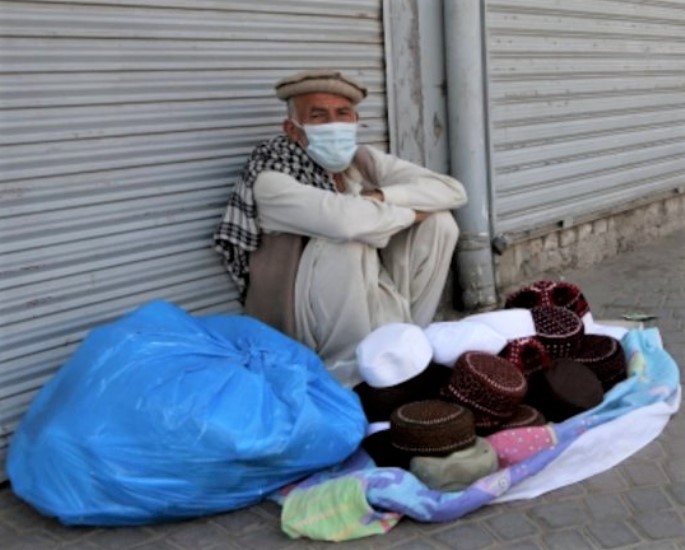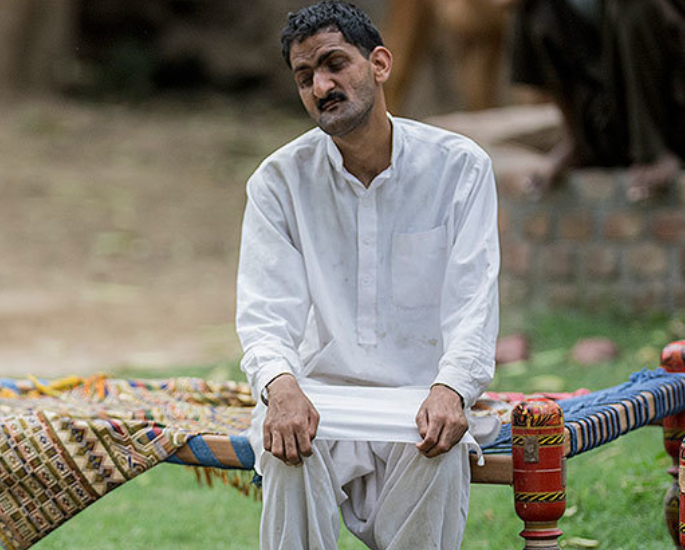A further increase in demand will have disastrous impacts
Pakistan has been no exception when it comes to experiencing the devastation of Covid-19. Cases have been increasing worldwide and Pakistan has been unsuccessful in controlling the outbreak.
Since Covid-19 struck for the first time in December 2019, it has been terrorizing the world. Overwhelming implications on businesses, relationships and mentality have echoed worldwide.
Every nation has suffered due to the virus but third world countries like Pakistan have suffered the most.
The first case of Covid-19 in Pakistan was reported in February 2020.
Since then, according to the World Health Organisation (WHO), there have been over 870,000 confirmed cases, while the death count has exceeded 19,400.
Although the number of active cases in the country is relatively lower, this is mainly due to the very low frequency of testing for the virus.
This has been one of the major repercussions within Pakistan as the sluggish state of testing heightens the tension and worry amongst communities.
However, the pandemic has had other severe repercussions. People from every walk of life are facing problems due to the outbreak.
But why has Pakistan not been proactive?
With new variants spreading across South Asia, DESIblitz explores the alarming ramifications of Covid-19 in Pakistan, and what this could mean for the future.
Economic Crisis
Pakistan’s already struggling economy has had a major setback due to the implications of Covid-19.
A monumental loss of approximately 1.1 trillion Pakistani rupees (PKR) is due to the disease.
This has had a major impact on the currency value and market finances, heavily affecting sectors including tourism, transport, and hospitality.
Some of the small and medium-sized enterprises such as salons and apparel stores are on the brink of collapse and may not be able to survive.
Without government intervention, this is very likely to occur, putting thousands of people out of a job.
Also, more than 8 million people who work as street vendors, small shop owners, construction workers etc rely on a daily wage.
However, lockdown, social distancing, and other precautionary measures have caused a significant decrease in demands thus putting financial strains on these businesses.
Companies within the manufacturing sector underwent downsizing to tackle the financial strains, rendering many workers unemployed.
The textile industry which is Pakistan’s major export is also facing a downfall. Consequently, there is a noticeable decrease in foreign reserves of the country.
In his journal, Impact of COVID-19 pandemic on micro, small, and medium-sized Enterprises operating in Pakistan, Mohsin Shafi stated:
“The impact of coronavirus on the global and Pakistani economy will leave deep scars.”
Covid-19 has put pressure on the pockets of a commoner as well as the reserves of the country. Although, with vice comes virtue.
Alongside the disruptive impacts on some business sectors, Covid-19 has produced new business opportunities.
Online markets and digital marketing sectors are flourishing. Also, protective gear such as masks, gloves and sanitisers are in high demand.
This small glimmer of optimism has spread within Pakistan’s communities.
However, if other industries continue to take financial damage, this optimism could be short-lived.
Educational Losses
Covid-19 has caused major damage to Pakistan’s educational institutes and its students.
The first wave of Covid-19 in March 2020 was extremely severe. Since then, schools and universities have been intermittently closed and opened several times, causing anguish among families.
Teachers are delivering online lectures and all physical learning activities have been put to a halt.
This situation has puzzled students as many have complained about the low efficiency of online classes.
Some of the institutions opted to take online exams but online exams are not a fair method of assessing students.
Due to the online mode of classes, students are devoid of first-hand experiences and practical learning.
This has deprived students of a conceptual and thorough understanding of the subject matter being taught.
In October 2020, Koen Geven and Amer Hasan designed a study to determine the possible future effects of Covid-19 on Pakistan’s education.
The standout finding was they estimated 930,000 children are expected to drop out of school due to their families income losses. They stated:
“Given that 22 million are already out of school, this represents an increase of almost 4.2 percent”
“Pakistan is globally the country where we expect the highest dropouts due to the COVID crisis.”
This represents how fragile the education system already is in Pakistan, and how new Covid-19 variants could be disastrous for schools and students.
Virus Shakes the Healthcare System
The burdens of managing Covid-19 have exhausted Pakistan’s healthcare infrastructure.
The increasing number of cases have exceeded the manageable amount and now patients are being deprived of proper treatment for Covid-19.
Almost all the ventilators available in the country have been occupied. There are no vacant ventilators available for new patients causing outrage and distress.
Oxygen demands have already reached the production capability, and a further increase in demand will have disastrous impacts resulting in many deaths.
Healthcare professionals are lacking Personal Protective Equipment (PPE) and N95 masks. The mortality rate among healthcare professionals due to Covid-19 is also distressing.
Almost 6,791 doctors, 1,360 nurses and 2,774 hospital staffers have reported being infected by Covid-19.
According to the Pakistan Medical Association, 142 doctors and 26 paramedics have died due to the virus. These conditions have led to a rise in anxiety and panic among healthcare workers.
Healthcare professionals remain under extreme pressure to help those infected, whilst also managing other diseases and sicknesses.
However, as hospitals become overwhelmed and resources deplete, there is growing fear over how possible it will be to control mutations of the virus.
Political Scenario
During the pandemic, political point-scoring has been at its peak.
Those opposing the government have been calling them out and declaring how badly the government has failed in controlling the disease.
Dr Rana Jawa Asghar, an epidemiologist based in Islamabad has said:
“The government and the opposition have politicised a pure health issue.
“Sending conflicting messages to the general public about the disease.”
The government is under great pressure due to the economic crisis and their inability to provide sufficient public advice and healthcare support has been highlighted.
In an article for Dawn, journalist Zahid Hussain emphasised:
“No effective nationwide strategy is in place to deal with the resurgence of the deadly infection.
“That is going to deal a blow to our economic recovery efforts.
“One expected the prime minister to show some statesmanship in the situation. But unfortunately, this has been missing.”
So, Covid-19 has also given a rise to political stirring and manoeuvres.
This crisis in leadership has become prevalent during the pandemic, and will undoubtedly cause more annoyance and resentment amongst the population.
Panic in Pakistan
The outburst of the pandemic was accompanied by a rise in panic and other mental health issues in the country.
People are either frightened of catching the disease and dying as well as tense due to economic and financial pressures.
Parks and playgrounds are closed due to Covid-19 and children and adolescents are deprived of social entertainment.
This has put children and adolescents at risk of having mental health issues.
In his journal article, “Covid-19 and Mental Health Challenges in Pakistan”, Muhammed Mumtaz expressed:
“Pakistan’s track record on mental health issues is not significant as estimated that there are over 50 million people suffering from a mental health disorder.
“Only 500 psychiatrists are looking for them with a ratio of 1:100,000 patients.”
This alarming figure displays the overwhelming state of mental health within Pakistan that has gone seemingly unnoticed.
Depression and irritability have been observed among people due to lockdown. These mental issues, more alarmingly, are going unreported.
This may be due to the lack of government understanding and their lacklustre approach to combating mental health issues.
However, organisations such as the Amazai Development Program and Sarhad Rural Support Programme are becoming prominent.
Collaborating with local administrations, these programmes are trying to extend resources to manage those with mental health issues.
Especially in rural areas, where many do not have the finances or availability to seek help.
Rumours and Conspiracies
Pakistan is a conventionalist society, where norms are often built upon superstitions.
These factors when added up with illiteracy and lack of scientific thinking provide fertile soil for conspiracies to grow in.
Conspiracies and rumours have become common during the coronavirus outbreak.
Many people believe Covid-19 is not a thing. Some believe that Covid-19 is some sort of foreign strategy to impose lockdowns and derail Pakistan’s economy.
The New York Times outlined a survey conducted by Gallup Pakistan in October 2020, which showed:
“55 percent of respondents in Pakistan doubted that the virus was real.
“46 percent believed it was a conspiracy.”
This attitude means it has been tougher to impose rules and could complicate the measures taken for new variants.
Also, the masses have rejected following standard procedures and protocols as they believe it to be against religious values.
Many believe the vaccine for Covid-19 is part of biological warfare against Pakistan which many find logical and quite true.
Even though this way of thinking has somewhat changed, the foundations of these theories have contributed to infections.
This is where the government and healthcare officials should step in. Providing scientific and statistical information will help reinforce the seriousness of this disease.
Adapting for Change
The availability and validity of information have been minuscule and that is where Pakistan need to adapt and evolve.
Given the increasing rate of infections, Pakistan has a duty to inform everyone on how to be safe, without politicising the situation.
Without jeopardising the focus on other areas such as mental health, government intervention is desperately needed in different sectors of Pakistan.
To ensure safety in any part of Pakistan, society must collaborate, even though this is more difficult given the population size.
Health and safety can only be guaranteed if everyone knows how to cooperate appropriately.
For a country like Pakistan, there is a dire need of educating the masses about Covid-19 on a national basis. This has nothing to do with the literacy rate but the quality of information.
































































